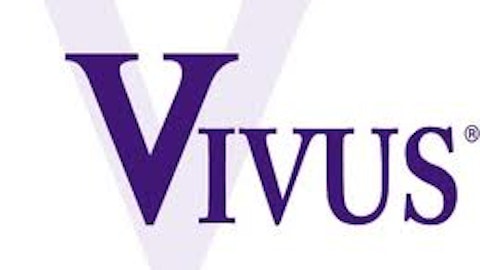4) Near-Term Risks
Risk aversion rose along with the lack of detail from Arena on withdrawing the MAA in the EMA. The lack of information is due to the CHMP (Committee for Medicinal Products for Human Use) needing to first accept the withdrawal.
In regards to the Cardiovascular Outcomes Trial (“CVOT”), it is still not finalized with the FDA.
5) Competitive Analysis
Competitor VIVUS, Inc. (NASDAQ:VVUS) received approval from the FDA for its risk evaluation and mitigation strategy (“REMS”) for Qsymia. Vivus may now dispense Qsymia to be dispensed through pharmacies, in addition to mail-order pharmacies. The approval benefits Vivus, but Arena thinks that it, too, may benefit in signing up larger payers.
VIVUS, Inc. (NASDAQ:VVUS) also reported quarterly earnings on May 8, 2013. The company reported Qsymia sales that were below consensus estimates. Worse still was that nearly $6 million in inventory needed to be written down. On its conference call, Vivus said that it would accelerate adoption of Qsymia by physicians. This will be done by growing insurance coverage and driving patient trials, in effect lowering costs for patients.
Orexigen Therapeutics, Inc. (NASDAQ:OREX) also reported on May 8. The company lost $0.21 per share on revenue of $857,000. The company is still in the developmental phase for Contrave, its lead product for obesity treatment. Orexigen completed Phase III clinical trials for Contrave.
When Orexigen Therapeutics, Inc. (NASDAQ:OREX) reported quarterly results in March, the company lost $0.41 per share. Revenue was $857,000, hurt by higher operating expenses. Expenses for Orexigen Therapeutics, Inc. (NASDAQ:OREX) rose to $33.3 million, compared to $5.2 million in the previous year.
Conclusion
The unexpected withdrawal of BELVIQ in Europe surprised investors, but now that the completion designation for the drug in the United States is given, it should provide a sustained, short-term lift for shares. Insider sales remain light, with 6 insider sales and 6 buys in the last year. Conversely, insider sales occurred 21 times, compared to 11 insider purchases in the last 12 months.
If bearishness rises, investors could look at warrant pricing as a possible guide for support. At December 31, 2012, Arena had warrants to purchase 3.4 million shares at an average exercise price of $6.23 per share. There were also options to buy 13.8 million at an average exercise price of $4.44.
Who will win the obesity drug market?
Can VIVUS, Inc. (NASDAQ:VVUS) pick up its lagging sales and fend off the competition, or will Arena Pharmaceuticals reign supreme in the obesity space? If you’re in the dark, grab copies of The Motley Fool’s premium research reports on VIVUS and Arena Pharmaceuticals to stay up to date. Senior biotech analyst Brian Orelli gives investors the must-know information, including an in-depth look at the obesity market and reasons to buy and sell both stocks. Click now for an exclusive look at Arena and VIVUS — complete with a full year of free updates — today.
The article Looking at Arena Following Sell-Off originally appeared on Fool.com.
Copyright © 1995 – 2013 The Motley Fool, LLC. All rights reserved. The Motley Fool has a disclosure policy.

